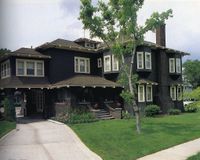NRHP: Glade-Donald House
Contents
Glade-Donald House
NRHP Reference #: 85002140
NRHP Listing Date: 19850912
Location
1004 W Division, Grand Island, Hall County, Nebraska
View this property's location
View all NRHP properties on this map.
Summary
The Glade-Donald House is a distinctive example of the Shingle style. The house is completely sheathed with wooden shingles, and incorporates many bay and oriel windows, including two prominent bow windows on the front facade. The house was built about 1905 by Henry Glade and remodeled by Lawrence Donald in 1918 and by John Donald in 1934. Russell Rohrer of Hastings was the decorator in the 1934 remodeling and created a very formalized and rich interior, with velvets, elaborate wallpapers, chandeliers, and other imported goods. All three owners were prominent businessmen in Grand Island. Glade was the founder of the Henry Glade Milling Company, and brothers Lawrence and John Donald established the Donald Company, a leading dry goods and grocery firm that served Nebraska and surrounding states for over fifty years. The property also includes a garage/servants' residence built in 1923, which originally provided quarters for the butler and his wife.
Further Information
Bibliography
About the National Register of Historic Places
The National Register of Historic Places (NRHP) is the country’s official list of historically significant properties. To be eligible for the NRHP a property must generally retain their historic appearance, be at least 50 years old, and have the potential to be documented as historically or architecturally significant at either the local, state, or national level. The National Register of Historic Places is a National Park Service program administered by the Nebraska State Historical Society for the state of Nebraska. Visit the Nebraska State Historical Society's website to learn more about the program.
